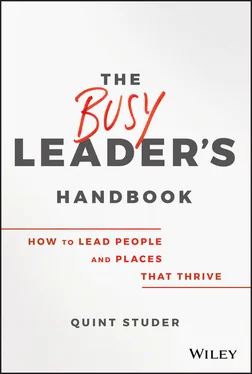The mind-set and attitude of followers is very important. That’s why I’ve come to believe that the best leaders are experts in followership. They understand that great leaders can’t exist without great followers. It takes both roles to create a successful organization, and it’s a reciprocal relationship. And the best leaders function well in both roles.
To do this it’s important to acknowledge how important followers actually are. It can feel like leaders get all the glory. From all the hype you hear and read about leadership, it can seem like everyone wants to be “in charge.” Of course, this is far from the truth. There are many people out there who thrive in the role of follower. They have a valuable skill they want to use and would far rather focus on applying it than spending their time strategizing, convincing, and telling others what to do. And frankly, followers can be just as valuable as leaders to the growth of a company—perhaps even more so.
The fact is, “command and control” is on its way out. Right now we are in a period of struggle as many members of the old guard still want to lead in traditional ways, while newer leaders try to figure out new models and structures that work well. As younger generations replace the older one, more change will occur. One thing’s for sure: followers can no longer be passive order takers or “yes men” and “yes women.” Good followership is active, dynamic, and creative. It gets noticed and rewarded.
As organizational hierarchies become flatter, followers have become more influential and powerful. It’s not surprising that those who succeed at followership often transition into leadership roles later in their career.
What’s more, every leader is also a follower in some capacity or some area of life. That’s why everyone, whatever their title or role, needs to master the art of followership.
If you’re a leader reading this I hope you will take these following tips to heart in your own work with your own supervisor. (I’ve found that everyone has a “boss” of some sort—even if you’re the business owner or CEO, you may answer to the board of directors.) I also urge you to share them with employees as they seek to be the best followers they can be:
Bring your “A” game every day. Work ethic is one of the most critical qualities a good follower can have. I believe most people want to do a great job. Sometimes, though, without even realizing it, we can lose our focus. We can even get in the habit of coasting or running out the clock instead of really engaging and giving it our all. Try not to let this happen. When you’re at work, really work.
Focus on intended results, not checking off boxes. Being a good follower doesn’t just mean carrying out orders in a vacuum or going through the motions. It means following a vision to an intended destination. If you’re not 100 percent sure what the leader wants to accomplish as a result of a task, ask them to clarify. They might just assume you are on the same page when you aren’t. They will appreciate that you asked.
If you’re wondering about the why, ask. I am talking here about the larger why behind what you’re being asked to do. Usually, this is connected to the greater good of the customer or the company (or ideally, both). Asking about the why will keep you from jumping to the wrong conclusions and perhaps heading down the wrong path in order to “help.” Just as important, knowing the why gives your work meaning and keeps you connected to a sense of purpose, which is the source of our motivation.
Always manage up the organization and the leader. Great followers know their own well-being is directly linked to the well-being of the company and its leadership. It makes no sense to tear down either, or to use “we/they” language with coworkers or customers.
Find the courage to speak up if you think the leader is making a mistake. This can be extremely tough, but part of the job of a follower is to protect the boss (even from themselves). You have an obligation to give your honest opinion. A good leader will be grateful that you care enough to give honest feedback.
If you’re asked to take on more responsibility, accept it. In fact, volunteer for it when appropriate. This makes you more valuable to the company, and the experience you gain can dramatically increase your skill set. Be willing to take risks and step out of your comfort zone. You will never regret growth.
Ask for training if you don’t feel qualified for something. Don’t wait for the boss to offer. You are responsible for your own competency and your own advancement.
Be trustworthy. Tell the truth. Keep your word. Trust is the foundation of the leader/follower relationship, and it goes both ways. There has been a lot said and written about being a trustworthy leader, but it’s just as critical for followers. The more leaders trust you, the more responsibility they’ll give you and the more valuable you’ll become.
Be a proactive communicator (especially with the project leader). This is so important in a complex work world with all of its moving parts. It makes you far more effective at your job. There is no way the boss can keep up with everything that’s going on. Priorities can change suddenly, and by checking in regularly, you can make sure that what mattered most last week still matters this week.
Seek to be positive without being fake. Chronic complainers, naysayers, and cynics are exhausting for leaders, and they actively hurt morale. Sometimes dissent and critical feedback are necessary, of course, and it’s far better to speak up than to pretend to agree with something you know to be wrong. In general, though, great followers try to create positive energy most of the time. It feels better to everyone (including you).
Strive to be a good collaborator and support your team members. If you have a best practice, share it. Step in and help coworkers when they’re overwhelmed. Mentor new coworkers.
When you bring a problem, bring a solution. Great followers are problem solvers. They know the leader is probably overwhelmed and don’t need one more thing dropped in their lap. Plus, as a follower, you’re probably closer to the problem than the boss is and can come up with a better solution than they can. Finally, this shows ownership and contributes to a more entrepreneurial culture.
Know what the what is for your leader. There is probably something that really, really matters to your boss. Maybe there is one particular client whose happiness matters above all else. Or maybe they hate missed deadlines more than anything. Pay attention to your leader’s what and laser-focus on meeting their needs in this area. They’ll like you more, and you’ll be able to build a productive relationship with them.
If you find that these behaviors come naturally to you, guess what? Those around you might already view you as a leader even if you don’t think of yourself that way. Here’s why.
The Best Leaders Actually See Themselves as Followers
I recently read a fascinating article in the Harvard Business Review written by Kim Peters and Alex Haslam. 1In it, the authors talk about their study of Royal Marine recruits and whether they self-identify as “natural leaders” or as followers. The study found that those who viewed themselves as leaders were, indeed, more likely to be seen by their commanders as having more leadership potential than the recruits who saw themselves as followers. Yet their fellow recruits didn’t agree. Peters and Haslam wrote:
. . . we found that recruits who considered themselves to be natural leaders were not able to convince their peers that this was the case. Instead, it was the recruits who saw themselves (and were seen by commanders) as followers who ultimately emerged as leaders. In other words, it seems that those who want to lead are well served by first endeavoring to follow.
Читать дальше












